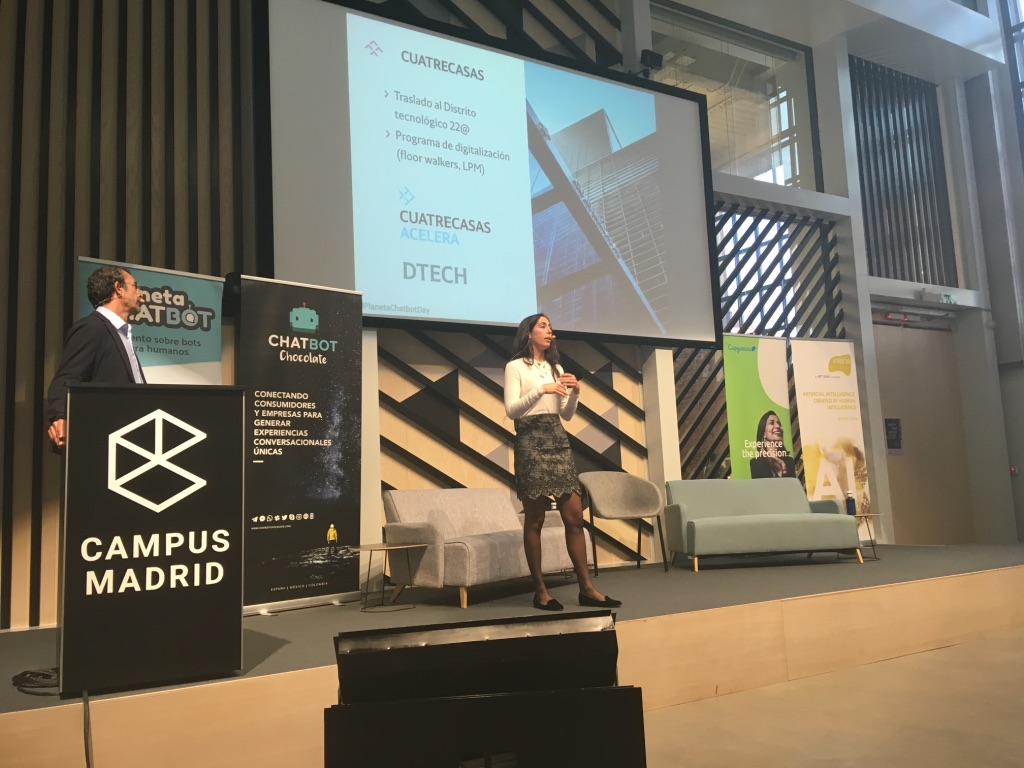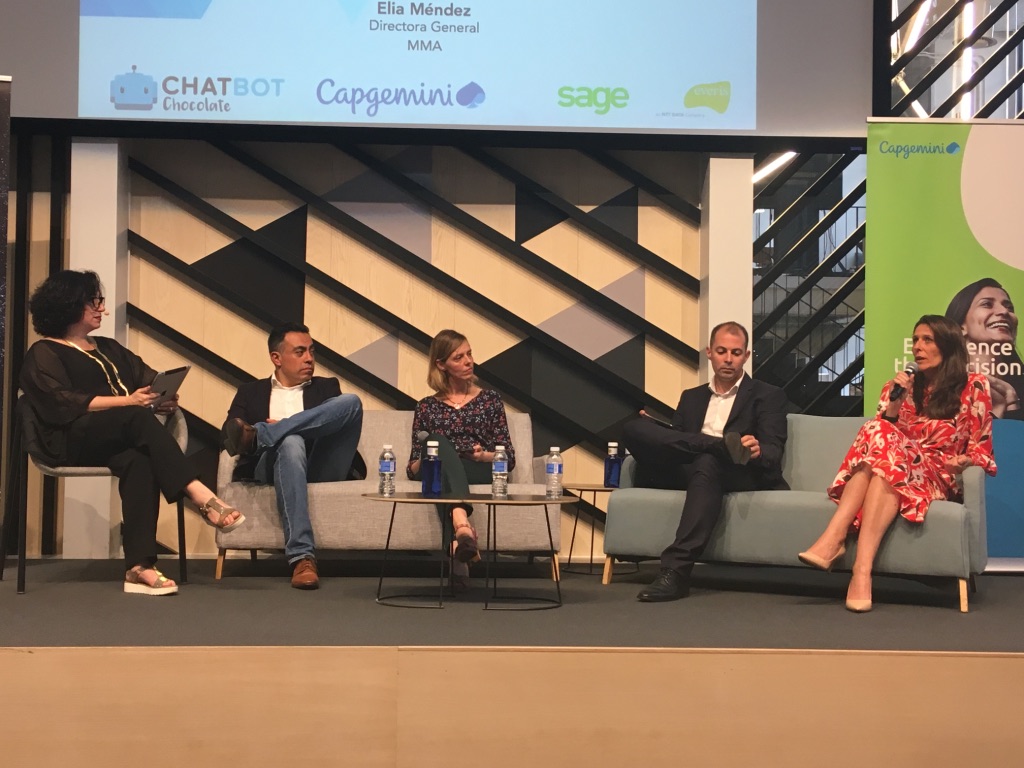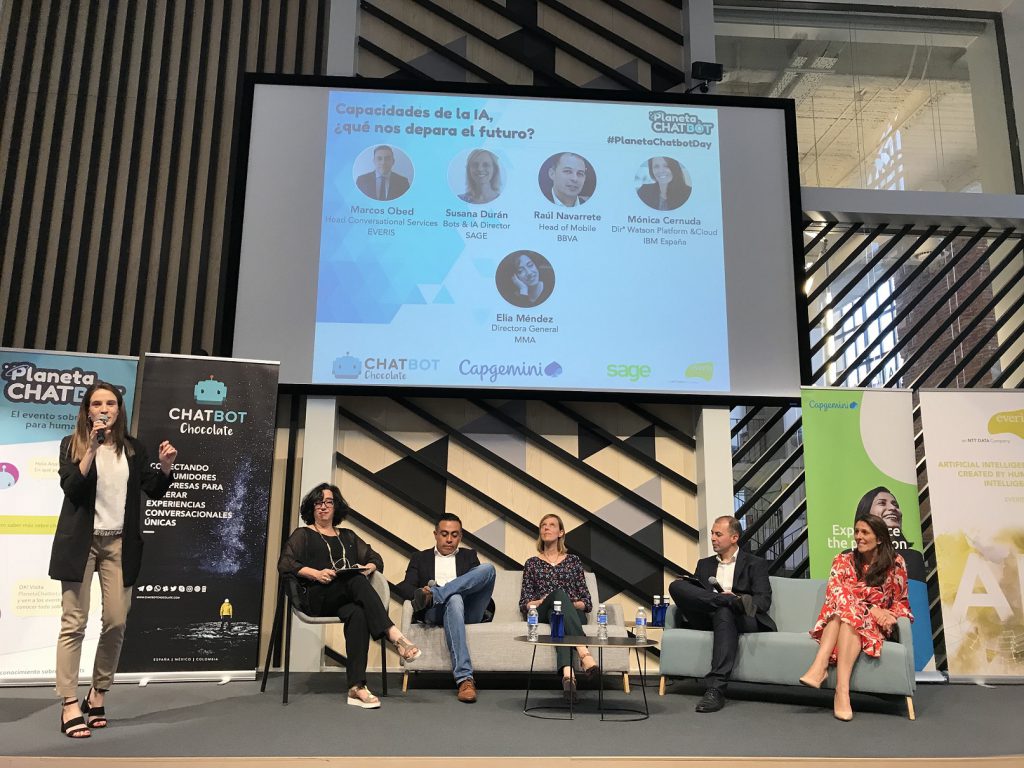Experts debate the effects of artificial intelligence on day-to-day life and how we can expect business as we know it to change at a conference organised by Planeta Chatbot.
A year after the launch, three events in Madrid, one event in Barcelona, and another in the Canary Islands, Planet Chatbot – the leading website in the area of artificial intelligence and chatbots, created by over 350 experts in the sector – yesterday organized a very special event at Google Campus Madrid to celebrate its first birthday. A dozen leading companies in the industry, including Gartner, BBVA, Capgemini, Chatbot Chocolate, and Everis, were in attendance, analysing how chatbots and AI will change our-day-to- day lives and affect business as we know it.

In his presentation, titled “The Impact of AI in large companies”, Miguel Ángel Morcuende, Territory Manager at Gartner, mentioned that “although everyone talks about artificial intelligence (AI) and, by 2020, all technologies will include it, there’s a lot of work to be done, especially bearing in mind that 9/10 companies interviewed cite a lack of knowledge about the subject as the main barrier to adopting it”. He went on to explain “AI allows us to classify, filter, and order the amalgam of business data we get in order to be able to reach our business goals. Companies want IA to tell them how to be faster and more efficient, how to better process and analyse data, and how to improve the client experience.”
Continuing the theme of businesses and how they are adapting to these new technologies, the second presentation, “Conceptualizing chatbots for businesses”, by managing partner of bot development agency Chatbot Chocolate, Ángel Hernández, discussed how the growth of messaging apps and social networks have changed how we communicate with each other. “This presents a new opportunity for companies, as it means we can provide customer support 24/7 via chatbots on the mobile apps that the consumer already spends 80% of their time on. There’s another great advantage, in that the conversational format means that there’s no adaptation process because young and old are used to the concept of chatting”. He also reminded attendees that companies need to evaluate what really makes sense to implement and understand the challenges of the technology involved properly.
Immediately after, Diego García Puado, Head of Digital Clients at Capgemini, took the stage. He spoke about how and where user-company interaction is going to change over the next two years. The physical shop is the past, the mobile is the present, and chatbots are the future. He went on to say; “we’re coming into an initial phase in chatbot maturity – they’re able to maintain basic conversations but are far from being able to hold a fluid conversation. There’s a lot to do before we’ll be fully adapted to a new type of consumer that prizes experience and immediacy. In fact, 49% of consumers prefer a chatbot to a shop assistant or customer service representative, simply because a chatbot is quicker”.
The final presentation centred on the relationship between artificial intelligence and law, a subject of real interest to attendees. The presentation was made by Andrea Ortega Villalobos, lawyer and innovation project manager at Cuatrecasas, and Rubén Agote, managing partner at the law firm. Agote maintains that chatbots present several legal challenges that will have to be addressed, such as the privacy of data passed on to programmers or decisions that look automatic, but behind which lies a legally responsible person.
During her speech, Andrea Ortega Villalobos explained some of the legal challenges presented by artificial intelligence that provides legal services, and underlined the need for “large law firms to collaborate with startups so they truly understand how these new technologies are changing and so they can develop them together”. Rubén Agote, who agreed, reminded us of the legal challenges presented by these technologies and underlined the need for “law and technology to work together”. He also posed various questions that affect both sectors, such as the legality of data collection by these technologies and civil rights for robots.
The Capabilities of Artificial Intelligence: What does the Future Hold?
Following the presentations, a roundtable discussion moderated by Elia Méndez Bravo, managing director of the Mobile Marketing Association (MMA), took place. In it, Raúl Navarrete, Head of Mobile Channel at BBVA Spain; Marcos Obed, Head of Conversational Services at Everis Europa; Susana Durán, Mobile & Bots director at Sage, and Mónica Cernuda, Watson and Cloud Platform Director at IBM España participated.

All of the participants agreed that many users still associate artificial intelligence with robots bent on taking over the world, which is in fact far from reality. For Mónica Cernuda, “artificial intelligence helps us to understand the vast amounts of data generated around us and which can be used by any sector. In Spain, we’re currently working with around 9 completely distinct industries. Public services, financial services, insurance companies, logistics, education, tourism, fashion, health…are just a few examples of sectors that are using artificial intelligence”.
BBVA spokeswoman Susana Durán got into specifics about banking. “Clients are increasingly digital. 44% of our clients in Spain are on mobile, and 55% are digital. Artificial intelligence will revolutionise the way that clients interact with the bank, encouraging the development of alternative channels like chatbots. Ultimately, however, it is the client who decides how to communicate with us”. She added: “The client is looking for more natural and human ways of interacting, like voice. The next step is very similar to what we saw in the movie Her, where a machine can take decisions. And we don’t have to wait 5 years to see this – it’s already here”.
Employment was another key point from the debate. We’re at a point where new job roles are emerging, and others are disappearing. Marcos Obed added, “We’re seeing a transformation that will force us to become more specialised and where training and education will help not only jobs that currently exist but also jobs that will exist in the future”.







